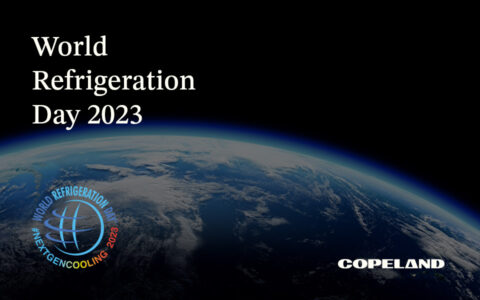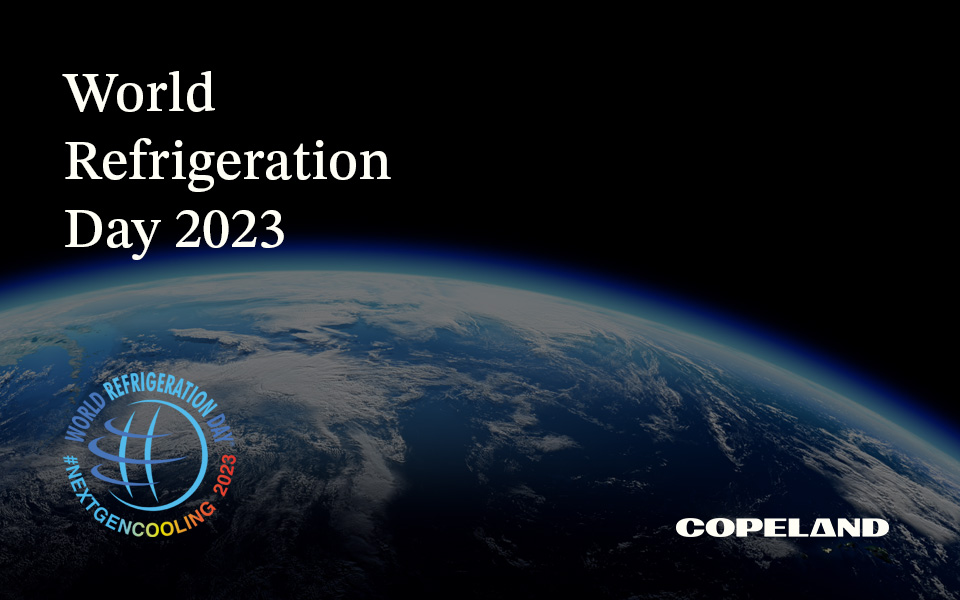Looking toward the next generation of cooling on World Refrigeration Day

*On June 1, 2023 Emerson’s Climate Technologies business became a new standalone company – Copeland. Though our name has changed, we are building on more than a century of HVACR innovation and industry leadership, and Copeland continues to offer the same products, industry stewardship, and learning opportunities you’ve grown to trust. Information found on this webpage posted before June 1, 2023 may contain our old name or branding, but you can be at ease knowing it was created with the knowledge and expertise of Copeland.
Every year on June 26, we pause to celebrate World Refrigeration Day — a day when global refrigeration, AC and heat pump industry stakeholders reflect on the vital contributions that refrigeration, comfort heating and cooling have made on modern society. This year’s World Refrigeration Day theme, Next Generation Cooling, inspires us to look toward the future of HVACR and explore the technologies and trends that are shaping the development of next-generation cooling and heating solutions.

For the past several years, Emerson Climate Technologies has been a proud sponsor of this event. This year, we are excited to honor this sponsorship under our new standalone company name and trusted industry brand, Copeland. Building on more than a century of HVACR industry leadership and innovation, Copeland is now poised to focus our efforts on developing and innovating the next generation of sustainable HVACR technologies.
Over the past decade, our industry has begun to make a significant shift toward more sustainable, energy efficient and environmentally friendly cooling and heating technologies. The refrigerant landscape has changed dramatically during that time, as the phasedown of hydrofluorocarbon (HFC) refrigerants makes way for alternatives with lower-global warming potential (GWP).
It’s estimated that through the global implementation of the Kigali Amendment to the Montreal Protocol, the phasedown of high-GWP HFCs could prevent up to 0.5 °C (.9 °F) of warming by the end of the century. In addition to the global HFC phasedown, coordinated actions to improve cooling efficiencies could potentially double these climate benefits.
Today, with the alignment of environmental regulations and the push for corporate sustainability initiatives, our industry is rapidly accelerating toward a lower-GWP future.
Supporting the migration to lower-GWP refrigerants
Developing the next generation of HVACR technologies requires the use of emerging and existing lower-GWP refrigerants, particularly CO2, R-290 and A2Ls — each of which will play an important role in future equipment strategies. It’s important to understand that, unlike previous generations of HVACR, there will not be a one-size-fits-all approach to solution development. Tomorrow’s solutions will be more targeted toward specific applications and give end users more options in meeting their specific operational and sustainability goals, as well as appealing to their personal preferences.
Copeland has been preparing its compression, condensing units, controls and related system components for this transition for more than a decade. Today, we lead the development of fully integrated CO2 components for centralized systems, which are helping our original equipment manufacturer and retail customers to successfully deploy these systems throughout the U.S.
In self-contained refrigeration units that use R-290, Copeland was among the earliest providers of R-290-qualified compression technologies. Today, we’re continuing to support increases in R-290 adoption and preparing for the potential for higher charge limits, which has been proposed and is progressing through regulatory and industry channels.
Along those lines, the stage is set for the use of A2L refrigerants in remote condensing units and distributed refrigeration strategies. Already approved for use in the AC sector, A2Ls are working their way through the approval process in commercial refrigeration (subject to use conditions per application). Copeland has been preparing for the emergence of A2L refrigerants for several years. We’re well along the process of qualifying our major compressor lines for use with A2L refrigerants, while developing the leak detection and system control strategies that support their safe, reliable application.
Focus on energy efficiency, reliability and sustainability
The next generation of cooling and heating technologies will also require the use of system strategies that deliver significant improvements in energy efficiency. Although achieving this requires a system-wide approach, it starts by recognizing the importance of variable-capacity modulation compression technologies.
Instead of designing systems to run at maximum load conditions regardless of conditions — resulting in consistently high energy consumption — variable-speed compression strategies can modulate capacity according to changing load requirements. In doing so, systems can achieve significant reductions in energy consumption, while improving temperature precision and increasing system reliability. To support this system design strategy, Copeland has developed award-winning variable-speed compression solutions for both AC and commercial refrigeration applications.
We’re also keeping a close eye on the future of comfort heating and cooling technologies, where global stakeholders and environmental initiatives are working toward a future goal of electrification. To reduce greenhouse gas emissions, electric heat pump technologies have been identified as the preferred strategy for achieving this goal. Based on the research we’ve conducted at The Helix Innovation Center, we’re exploring approaches that enable continued progress along the path toward this goal, including dual-fuel heat pump technologies that bridge the gap between the present and the future — with the short- and long-term goals of achieving maximum sustainability at every step the way.
Without question, Next Generation Cooling strategies are evolving quickly, and World Refrigeration Day gives us an opportunity to see which direction our industry is collectively pointing. The next decade will be an exciting transition period for HVACR stakeholders. At Copeland, we’re not simply waiting to see what the next generation of cooling and heating technologies will look like; we’re actively developing them.
For more information on Copeland’s participation in World Refrigeration Day, please visit this webpage.

8 proven strategies for rigorous cold chain management
by Dan Knauer | Cold Chain
Preparing for the approval and safe use of A2Ls in commercial refrigeration applications...
Protection for high-value shipments just got even better
by Alex Axelsson | Cold Chain, Transportation
We’re excited to announce the release of Copeland’s newest real-time tracker, the GO Real-Time...

Three proven strategies to prevent cargo theft
by Chris Lafferty | Cold Chain, Transportation
The over-the-road (OTR) transport industry is experiencing a surge in cargo thefts. As thieves...
The post Looking Toward the Next Generation of Cooling on World Refrigeration Day appeared first on Copeland.